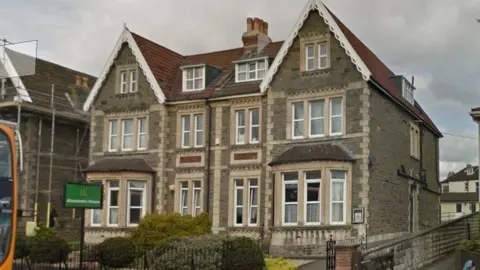Murdered teen said care system 'destroyed' her life
 PA
PAA teenager murdered by a fellow care home resident who was fascinated by necrophilia wrote a letter detailing how social services had "destroyed" her life, an inquest has heard.
Melissa Mathieson was 18 when she was strangled by Jason Conroy at Alexandra House - which provided residential care for adults with autism and Asperger's in Knowle, Bristol - in October 2014.
Conroy, now 28, was jailed for life in 2018 for the sexually motivated killing, carried out hours after Miss Mathieson complained he had been stalking her.
On day one of her inquest, Avon Coroner's Court heard Conroy had previously attempted to kill his mother and had tried to strangle a teacher so he could abuse her.
Miss Mathieson's letter titled Social Services Have Destroyed My Life was read to the court as part of written evidence submitted by her mother Karen Mathieson, who died from cancer a year after her daughter's death.
"I felt like I was dragged away from my home and everything I knew," wrote Miss Mathieson, who was from Windsor in Berkshire and had been sent to Alexandra House by social services at 18.
"They never took into consideration my age or the distance from my family. I was still a child, just very confused."
 Avon and Somerset Police
Avon and Somerset PoliceMrs Mathieson wrote "the system" had failed both her daughter and Conroy, adding learning of Conroy's previous violent behaviour had compounded the family's anger.
"Melissa did not have a nasty bone in her body. She was a gentle, kind and lovely girl," Mrs Mathieson added.
"Not only has Jason Conroy ended Melissa's life, but he has also ended his own. He should have had his problems addressed a long time ago."
Nearly a decade on from her own death, Mrs Mathieson's written evidence described how her daughter had "lived in a bit of a fantasy world".
She explained she had been influenced by the Tracy Beaker stories about a child who lived in a children's home.
This was echoed by James Mathieson, who said his daughter had an "obsession" with the series.
"This was partly driven by her condition but was also inspired by the fact that she had always struggled to make friends her own age," he said.
He described his daughter as a "very loving person" who was "always full of cuddles" but said she "struggled from a very early age".
He explained there were times Melissa "would make allegations" and "social services would get involved".
 Family Handout
Family HandoutMrs Mathieson described interactions with social services as "impossible" and wrote they "did not seem to realise that Melissa loved the attention she got from people in authority".
Miss Mathieson's family said by the time she was 16 they felt they "no longer had a voice" and claimed social services were "putting ideas in her head about living away from home".
"Ultimately, it was this that put Melissa in danger," Mrs Mathieson said.
'How wrong I was'
In a statement Mr Mathieson said he and his wife were "sure" sending their daughter "to another care home in a big city was not going to help her".
However, he eventually suggested she should go as she was turning 18 and it could "possibly help her".
"How wrong I was," he said. "I have to live with the consequences of that every day."
He told the court how it had quickly "become clear" Alexandra House was not the right place for her.
"They didn't seem to know anything about Melissa," Mr Mathieson said.
The court also heard how Miss Mathieson had been hospitalised for severe anxiety at 16, after which she developed psychosis.
Her mother's evidence described how her daughter was "pumped full of drugs".
"When she came home, she would have further outbursts," Mrs Mathieson added. "It was a truly horrible year."
Despite her family arguing Miss Mathieson's learning disability meant she should not be able to make a decision to move away from home, by 18 she was living at the facility in Bristol.
"We were told that Melissa was going to Alexandra House to get her behaviour back on track, but actually she got killed by the very things that we always tried to teach her to be wary of," Mr Mathieson wrote.

Alexandra House was fined £125,000 after admitting health and safety charges in failing to protect Miss Mathieson.
A serious case review into her death found care home staff had not acted on recommendations in a forensic report.
The report had warned Conroy had "a high risk of future physical and sexually harmful behaviour".
The serious case review, published by Bristol Safeguarding Adults Board, said a failure to act on previous warnings of Conroy's behaviour had cost Miss Mathieson her life.
The inquest continues.
Follow BBC Bristol on Facebook, X and Instagram. Send your story ideas to us on email or via WhatsApp on 0800 313 4630.
